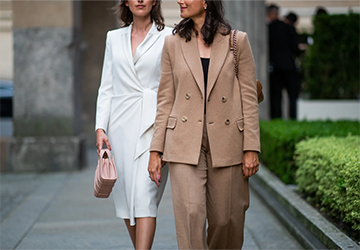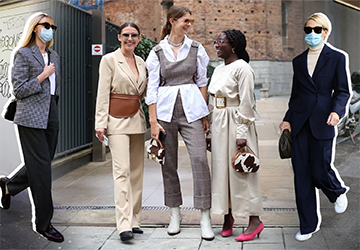In this fast-paced world, people are so busy working and making money that they forget about learning the basic set of rules for an impressive dressing style. For job interview attire, you need to style professional clothing for making a good impact at your job interview as it depends heavily on your look. Your interview fashion should be professional and smart to make the employers think of you as a dedicated candidate who is serious about the job. You can show your devotion to the job and your respect for the chance by dressing for success appropriately with the business's values and professional requirements. Consider your sanitation and extras, and select enduring, classic pieces which complement you nicely but keep in mind that getting dressed for business is about displaying your competence and trustworthiness through your wardrobe rather than trying to change who you are. Be yourself in your job interview attire but have a formal and inspiring overall look. This article will examine the best fashion options for employment interview apparel and provide easy-to-follow advice on how to look successful and make a strong first impression.

1. Understanding the company culture
When determining what to dress for a job interview, it is important to understand the corporate culture. The interviewer may get an image of you based on your preference for clothing, which may also speak to your competence and suitability for the company. While some workplaces have strict clothing codes, others could be more relaxed or offer a creative atmosphere. If the work environment is informal, you might choose to dress smart casual. If smart casual, err on the side of business casual. Choose formal business clothes if it is business casual. Unless the firm expressly specifies that it is appropriate, avoid wearing highly formal attire.
2. Traditional and Tailored Business Garb
A conventional and formally attired style suitable for office contexts, such as employment interviews, company headquarters, or formal business functions, is classic and tailored business wear. This style of clothing conveys competency, assurance, and regard for work environments.
Men should wear a two-piece outfit with matching pants and coat, and they should wear a white or light-colored long-sleeved, collared dress shirt. It must be spotless and nicely ironed.
On the other hand, women should choose a fitted skirt suit or a pantsuit. Pick traditional hues like navy, charcoal gray, or black. Additionally, put on a conservative, solid-colored blouse or button-up shirt. Resist low necklines and garish designs.
3. Business Casual
Dressing in business casual for an employment assessment might be a terrific way to make an excellent initial impression. With business casual, you can look polished, friendly, and at ease while still maintaining a certain level of formality.
Keep to neutral hues like khaki, black, gray, and indigo. Additionally, check that the fittings are not overly tight or loose. If you are uncertain about the business attire of your company try to lean on the side of being somewhat extravagantly dressed rather than being too casual.
4. Grooming and Hygiene
To portray yourself well in professional as well as private settings, grooming, and hygiene are crucial components. Maintaining good hygiene and grooming not only improves your appearance but also shows that you respect both yourself and other people. It includes your hygiene, hair care, facial grooming, nail care, clothing, fragrance, foot care, regular health checkups, etc. By taking care of these areas, you may increase your self-assurance and feel more at ease in social as well as work environments.
5. Pay Attention to Accessories
Making a strong fashion statement and completing your entire style require careful attention to your accessories. A simple dress can be improved with the right accessories by adding charisma, personality, as well as focus to minor details. But it's crucial to establish a suitable balance and refrain from going overboard with excessive accessorizing. For a job interview or formal event, opt for more conservative and understated pieces. Keep your accessories classy and businesslike. It may include minimal and classic jewelry, a professional bag or briefcase, a subtle scarf or tie, neat and polished shoes, etc.

6. Footwear Matters
When selecting something you're going to put on to an employment encounter and making an effective first impression, shoes are very important. Your footwear decision can have a big impact on how you seem overall and how the interviewer judges you. For job interviews, footwear with closed toes is typically more suitable and presentable. They should have classic designs like pumps, oxfords, or loafers. They have a classic, polished appearance that goes with many different outfits. Try wearing more comfy footwear, do not wear high heels, and choose moderately high heels that you feel comfortable walking in.
7. Dress Smartly for Creative Industries:
Although the attire requirement in the creative sectors is frequently more flexible than in typical corporate settings, this does not mean you should dress overly simply. Making a good impression on prospective bosses requires you to dress professionally, uniquely, and fashionably. Being yourself and uniqueness are valued in the intellectual industry. Maintain an elegant and competent image while using your attire to show off your taste in fashion.
8. Keep it Neat and Wrinkle-free
An attire that is nicely ironed and exhibited displays professionalism, appreciation for the interviewing procedure, and concern for particulars. Spend some time properly ironing your clothes before the interview. Make sure the edges, sleeves, and collars of your clothing are neatly pressed and wrinkle-free. To prevent wrinkles and creases, hang your clothing on a firm hanger. Maintaining proper alignment will reduce creases in your clothes. Moreover, stand still and sit straight, and maintain the neatness of your attire during the interview.
Conclusion
In short, the right attire for an employment assessment is unlikely to be hard to figure out. You may create a good image for a prospective employer by being aware of the corporate culture, adhering to traditional business professional attire, or adopting business casual where appropriate. You can convey reliability and trust to those conducting your employment interview by dressing appropriately.
